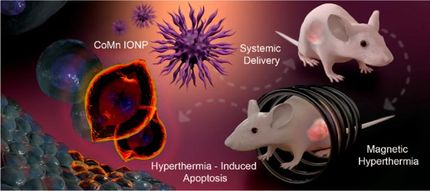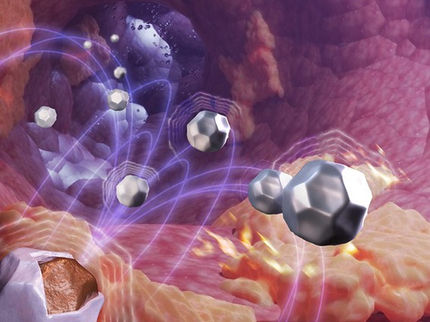Magnetic material attracts attention for cancer therapy
Advertisement
An extraordinary self-regulating heating effect that can be achieved in a particular type of magnetic material may open the doors to a new strategy for hyperthermia cancer treatment. Temperatures that can be tolerated by healthy body cells have long been known to destroy cancerous cells. An approach that uses magnetic particles that are introduced into tissue and heated remotely has found some success in treating cancer, but the technique is still some way from becoming a standard procedure.
One of the problems hindering progress is the insufficient heating capacity of magnetic particles. However, researchers led by Professor Kiyonori Suzuki at Monash University have found a material that not only heats rapidly: it also stops quickly and cannot go on getting hotter. What is more, the temperature it reaches is high enough to destroy tumour tissue, but too low to affect normal healthy tissue.
"This strong, self-regulated heating effect is unmatched by other materials," Professor Suzuki said. "It opens a novel design strategy for realising in vivo hyperthermia therapy."
The team, which includes other researchers from Monash as well as Professor Karl G Sandeman of CUNY-Brooklyn College and Imperial College London, is investigating well-known magnetocaloric materials known as first-order magnetic materials, which so far have attracted research interest chiefly for magnetic refrigeration. The exciting qualities of these materials are tied to their Curie temperature - the point (which varies for different materials) at which magnetic properties undergo change.
"We chose these materials for our study because the Curie point resides in the ideal temperature range for hyperthermia treatment of cancer cells," Professor Suzuki said.
A critical factor in the extraordinarily large heating power is the first order Curie transition. This is unlike the conventional Curie transition in that two magnetic states coexist. For complex reasons tied to this coexistence, the conversion of external magnetic fields to heat is maximized near the Curie temperature - and then above this temperature, the conversion effect abruptly stops.
The researchers are hoping that their proof-of-concept study, which was published in Applied Physics Letters, could pave the way for enhanced cancer therapies.
"Thanks to its extraordinary heating effect, these first-order magnetic materials could prove to be a minimally invasive and inexpensive way of achieving intracellular hyperthermia treatment," Professor Suzuki said.























































